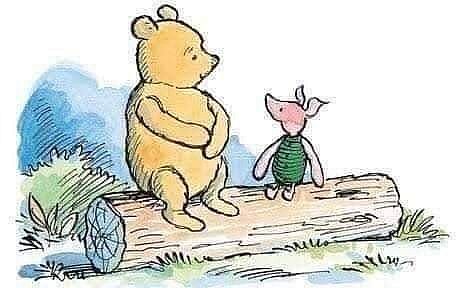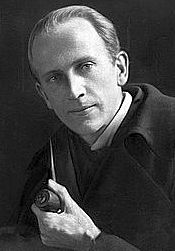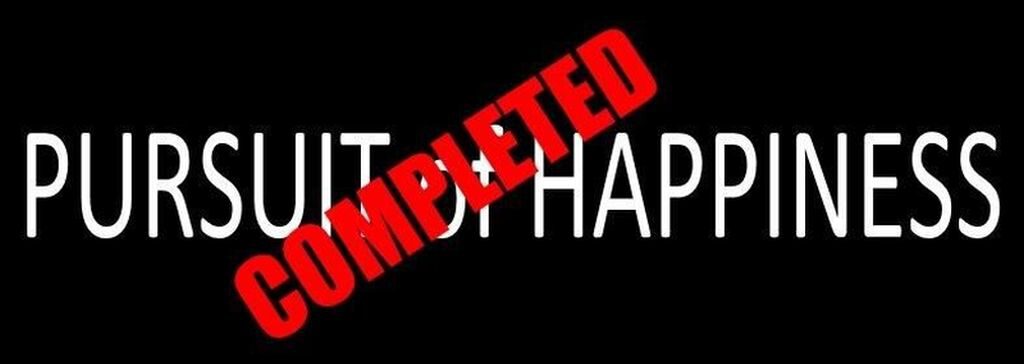
“Today was a Difficult Day,” said Pooh.
There was a pause.
“Do you want to talk about it?” asked Piglet.
“No,” said Pooh after a bit. “No, I don’t think I do.“
“That’s okay,” said Piglet, and he came and sat beside his friend.
“What are you doing?” asked Pooh.
“Nothing, really,” said Piglet. “Only, I know what Difficult Days are like. I quite often don’t feel like talking about it on my Difficult Days either”.
“But goodness,” continued Piglet, “Difficult Days are so much easier when you know you’ve got someone there for you. And I’ll always be here for you, Pooh.”
And as Pooh sat there, working through in his head his Difficult Day, while the solid, reliable Piglet sat next to him quietly, swinging his little legs…he thought that his best friend had never been more right.
A.A. Milne
Alan Alexander Milne
Alan Alexander Milne (1882 – 1956) was an English author, best known for his books about the teddy bear Winnie-the-Pooh and for various poems. Milne was a noted writer, primarily as a playwright, before the huge success of Pooh overshadowed all his previous work. Milne served in both World Wars, joining the British Army in World War I, and as a captain of the British Home Guard in World War II.
Though he went to Cambridge to study mathematics, Milne began to focus on writing while still a student. After getting his degree in 1903, he pursued a career as a writer and was soon producing humorous pieces for the magazine Punch. Milne took on the duties of assistant editor at Punch in 1906.

World War I
During World War I, Milne saw action as a soldier, including at the Battle of the Somme. When illness rendered him unfit for the front, his writing talent led to his being tapped to join a secret propaganda unit, MI7b, in 1916.
At the time, the mounting toll of World War I had dimmed public support and an anti-war movement was growing. The goal of Milne’s propaganda unit was to bolster support for the war by writing about British heroism and German bastardliness.
Despite being a pacifist, Milne followed the orders he’d been given. But at the end of the war, he was able to express how he’d felt about the work. Before the group disbanded, a farewell pamphlet, The Green Book, was put together. It contained contributions from many MI7b writers—and Milne’s sentiments can be seen in these lines of verse:
“In MI7B,
Who loves to lie with me
About atrocities
And Hun Corpse Factories.”
Playwright
Following his service in World War I, Milne became a successful playwright (along with original plays, he penned adaptations, such as turning The Wind in the Willows into the successful Toad at Toad Hall). Milne also authored a popular detective novel, The Red House Mystery (1922).
Wodehouse and Barrie
As a young man, Milne was friends with author P.G. Wodehouse, creator of the unflappable butler Jeeves. The two even joined J.M. Barrie – the man behind Peter Pan – on a celebrity cricket team. However, Wodehouse made a decision during World War II that Milne could not forgive.
World War II
Wodehouse had been living in France when the German army swept through. He was taken into custody and sent to live in a civil internment camp. But when the Germans realized just who they’d captured, they took Wodehouse to a luxury hotel in Berlin and asked him to record a series of broadcasts about his internment. Wodehouse, to his later regret, agreed.
In the talks, which were broadcast in 1941, Wodehouse maintained a light, inconsequential tone that didn’t go over well during wartime. Among his harshest critics was Milne, who wrote to the Daily Telegraph: “Irresponsibility in what the papers call ‘a licensed humorist’ can be carried too far; naïveté can be carried too far. Wodehouse has been given a good deal of licence in the past, but I fancy that now his licence will be withdrawn.”
(Some speculated that Milne’s main motivator wasn’t anger but jealousy; at the time, Wodehouse continued to receive literary acclaim while Milne was just seen as the creator of Winnie the Pooh.)
The rift continued even after the war ended, with Wodehouse stating at one point: “Nobody could be more anxious than myself … that Alan Alexander Milne should trip over a loose bootlace and break his bloody neck.”
Winnie the Pooh
Milne is most famous for his two Pooh books about a boy named Christopher Robin after his son, Christopher Robin Milne (1920–1996), and various characters inspired by his son’s stuffed animals, most notably the bear named Winnie-the-Pooh.
Christopher Robin Milne’s stuffed bear, originally named Edward, was renamed Winnie after a Canadian black bear named Winnie (after Winnipeg), which was used as a military mascot in World War I.
“The Pooh” comes from a swan the young Milne named “Pooh“. The rest of Christopher Robin Milne’s toys, Piglet, Eeyore, Kanga, Roo and Tigger, were incorporated into A.A. Milne’s stories.
Christopher Robin Milne’s own toys are now on display in the New York Public Library Main Branch in New York, where 750,000 people visit them every year.
Pooh first appeared in the London Evening News on Christmas Eve, 1925, in a story called “The Wrong Sort of Bees“. Winnie-the-Pooh was published in 1926, followed by The House at Pooh Corner in 1928.
Winnie the Pooh, the “Bear of Very Little Brain,” continues to be a bear with lots of fame. In fact, Pooh is honored every January 18th, otherwise known as Winnie the Pooh Day. That particular date was chosen because it’s the birthday of Alan Alexander Milne.

